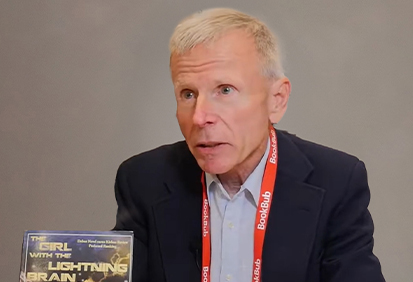
Author Cliff Ratza has written nineteen novels in the last seven years, blending science, humanity, and philosophy to explore what it means to survive. Each book stands alone, yet together they form a chronological sequence that delves into an overarching theme: no matter how extraordinary a person may be, anyone can become a victim in a world that cannot handle the truth—and must face the complexities of being “merely human,” best managed with an optimistic and pragmatic philosophy.
Cliff grew up in Chicago and, after graduating from top Illinois schools, launched a sales and marketing career that took him across the Southwest, Midwest, and East Coast. He later returned to Chicago to pursue teaching and computer programming, and seven years ago began dedicating time to writing novels. Today, in addition to being an accomplished author, he teaches at universities in Chicago, runs a sales and marketing consulting business, and serves as a Writing Coach for Lightning Brain Press and The Quippy Quill.
When asked how he managed to write so many novels in such a short period, Cliff shared an interesting reflection. He recalled reading The Lord of the Flies and The Inheritors by William Golding in high school—stories that explore human nature and societal collapse. The latter, which depicted the clash between Neanderthals and Homo sapiens, fascinated him and inspired a lifelong idea: to one day write about how modern humans would face a global crisis. Although his professional path delayed this ambition, he realized years later that he had been subconsciously crafting such a story all along. When he finally began writing, the stories “cinematically streamed” through his mind.
His first novel, The Girl with the Lightning Brain, begins in the year 2187 and follows Electra Kittner, a young woman whose neural network is rewired by a lightning strike at birth, giving her extraordinary abilities. She grows up amid a world gripped by a viral pandemic known as the Techno-Plague, terrorist threats, and an authoritarian regime rising under the banner “make America great again.” Through Electra’s journey, Cliff explores how humanity confronts extinction and moral decay in a rapidly changing world.
Cliff’s works soon caught the attention of Sandra Cruz of Foxpress Media, who learned about his novels while working on another project. After connecting with him, Sandra proposed several marketing strategies to increase AIDA—Awareness, Interest, Desire, and Action—among readers. Her initiatives included online book club appearances, Times Square electronic billboard campaigns, and managing Cliff’s Facebook page featuring podcasts. The collaboration proved successful, resulting in increased online engagement and stronger book sales.
When asked how his approach as a writing coach differs from others, Cliff explained, “I attend many writing seminars to stay current with what other coaches are saying. Most tend to use too many words without saying much, focusing on how difficult writing is and insisting that every new author needs a coach. My approach is the opposite—I use fewer words and tell beginning writers that they only need a little guidance, remembering this: Practice doesn’t make perfect. Perfect practice does.”